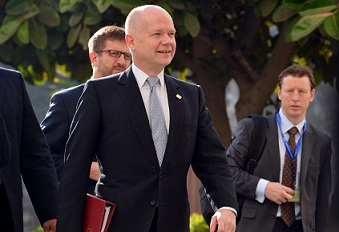
(DNE Photo)
Human Rights Watch (HRW) described the first trial of former president Mohamed Morsi as “badly flawed”, in a statement on Sunday.
The watchdog added in its statement that the trial was “compromised by due process violations, the appearance of bias and an absence of conclusive evidence”.
Morsi was sentenced to 20 years in prison on 21 April in the ‘Presidential Palace’ case, alongside 12 other defendants. They were found guilty of “demonstrating power and violence” and “inciting violence”. The court also sentenced the two other defendants in the case to 10 years in prison. All 15 defendants were acquitted of the killing protesters charge.
HRW reviewed the prosecution’s case file summary, arriving at the conclusion that there was little evidence to support Morsi’s conviction for complicity in the events that took place in December 2012.
The review showed that allegations against Morsi relied primarily on the testimony of military and police officers. The testimony of Major General Mohamed Zaki, commander of the Republican Guard, was chiefly used to prove the presence of an “agreement between Morsi and the Muslim Brotherhood to disperse anti-government protestors by force”. However, Zaki gave no evidence to support his hypothesis.
“The prosecution’s case was founded on the conjecture that Morsi was responsible simply because of his relationship with the Muslim Brotherhood,” said Sarah Leah Whitson, Middle East and North Africa Director. Whitson added that Morsi’s criminal guilt was not established in the case.
Whitson pointed that prosecutors had followed through on their investigation into those who may have detained and abused protesters outside the Presidential Palace. However, “prosecutors’ neglect of the deaths of Brotherhood supporters and disregard of the failure of the security forces to intervene undermine any claim that justice was done”.
On 5 December 2012, clashes erupted between supporters and opponents of Morsi outside the Ittihadeya Presidential Palace. The clashes resulted in the injuries of 748 people and the deaths of at least 10, of which seven are believed to have been Morsi supporters, according to the HRW statement.
Clashes followed days of demonstrations against a decree issued by Morsi in November of that year, which placed the president as well as the constituent assembly above judicial review.
HRW stated that only three of the ten people killed that day were included in the prosecutor’s file, “creating an appearance that the case was politically motivated against the Brotherhood”.
During clashes, Morsi supporters “unlawfully detained, abused, and interrogated” at least 49 anti-government protesters before turning them over to police the next day, according to the watchdog’s findings.
HRW had called on prosecutors at the time to examine responsibility for the protesters’ deaths and the security forces’ failure to intervene. The group also called for an investigation of leaders of the Freedom and Justice Party (FJP), the Brotherhood’s political wing, who publicly incited their supporters to arrest anti-Morsi protestors.
Lawyer Hoda Nasrallah previously spoke to Daily News Egypt about the irregularities of the case against Morsi, stating that “the motivations behind the charges are definitely political. Morsi and the other defendants have been tried not as individuals but as a regime”.
Morsi is a co-defendant in four other trials. He is accused of escaping Wadi El-Natrun Prison in January 2011, insulting the judiciary, espionage by working with foreign Islamist groups, and of espionage with Qatar.

